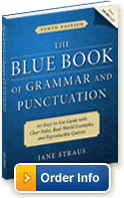|
Welcome to your GrammarBook.com E-Newsletter.

|
"I always enjoy and learn from your very clear and concise explanations of grammar rules."
- Sally A.
"I look forward to your E-Newsletters; they're the very best!"
- Brandy K.
"Your website is amazing! I've spent some time on the quizzes and have been impressed."
- Kerri M.
"I've been on your website several times and have read through your blog and LOVED it!"
- Paula F.
|
|
|
That’s what that means?
I know many avid readers, and I wish I read as much as they do. But to my surprise, very few of them read with a dictionary on hand. When I ask why, the answer is some variation on “It ruins the mood” or “I want to relax, not study” or the most self-deluded one: “I can figure out most words from the context.”
As for that last one, I can only say that I myself have guessed wrong on a word’s meaning too often to count, and many times if I had gone with what I guessed and not bothered to look it up, I’d have gravely misunderstood some of the author’s fundamental premises—yes, the stakes are that high.
I can illustrate this with a simple example: “Joe inferred that the judge was disinterested.” There are many smart people who would take that sentence to mean, “Joe insinuated that the judge didn’t care.” Boy, would they be wrong.
The sentence actually means, “Joe decided that the judge was unbiased.” Huge difference there. Would you rather have a judge who’s fair or one who wants to go home? “Disinterested” means “impartial.” It does not mean “apathetic”—that would be an uninterested judge.
And because so many people mistakenly think infer is a synonym for imply, a reader might see “inferred” and think Joe was hinting at something, when in fact he had reached a conclusion.
If just a simple seven-word sentence can cause such a misunderstanding, imagine tackling difficult authors like Lawrence Durrell or William Faulkner. Without a dictionary nearby, what you get out of these writers’ books might be a far cry from what they actually wrote.
So here are a few words that may not mean what you think they mean. Misinterpreting a key word can distort the meaning of a sentence and set off a chain reaction of misunderstanding that leaves the reader with a message the author never dreamed of sending.
Livid When someone is “livid,” do you think of red, white, or blue? The best answer is blue, not red. “Livid” does not mean “red-faced with anger.” The Latin lividus means “of a bluish color.” Second-best answer is white: “livid” can be a synonym for “pale.”
Benighted “He was a benighted soul in an enlightened time.” Many people associate it with “knighted,” and think “benighted” is a good thing to be. Far from it. Note the lack of a k—don’t think “knight,” think “night.” A benighted soul is clueless, ignorant, “in a state of moral or intellectual darkness.”
Scarify is a benighted synonym for “terrify”—scarify has more to do with scar than scare. It means to scratch or make superficial incisions. It also has agricultural applications having to do with seeds and soil.
Meretricious When you hear it, the first two syllables echo “merit,” and the word resembles meritorious. The similarity ends there. It means “flashy,” “cheap,” “tawdry”: “The candidate made a meretricious display of piety.”
(This tip was contributed by veteran copy editor Tom Stern.) |
|
Free BONUS Quiz For You!
[[firstname]], because you are a subscriber to the newsletter, you get access to one of the Subscription Members-Only Quizzes. Click here to take a Confusing Words and Homonyms Quiz and get your scores and explanations instantly!

"So convenient...hundreds of quizzes in one click."
[[firstname]], Subscribe to receive hundreds of English usage quizzes not found anywhere else!
- Take the quizzes online or download and copy them.
- Get scored instantly.
- Find explanations for every quiz answer.
- Reproduce the quizzes to your heart's content.
- EASY to use.
- No software to download.
- No setup time.
- A real person to help you if you have any questions!
"Fun to test my skills!" "The explanations really help...thanks!"
Your choice: Subscribe at the $29.95 or $99.95 level ($30 off - regularly $129.95).
"I download the quizzes for my students who don't have computer access."
Subscribe today to receive hundreds of English usage quizzes not found anywhere else!
"Makes learning English FUN!"
 |
Don't need all the quizzes at once?
You can now purchase the same quizzes individually for ONLY 99¢ each. Purchase yours here. |

Get Yours Today!
Get Amazon’s #1 Bestseller in Four Categories!
#1 in Grammar
#1 in Reading
#1 in Lesson Planning
#1 in Vocabulary |
The Blue Book of Grammar
and Punctuation by Jane Straus
An indispensable tool for busy professionals, teachers, students, homeschool families, editors, writers, and proofreaders.
Now available in print AND as an e-Book! Over 2000 copies are purchased every month!
Order Your Copy Today!
- Hundreds of Grammar, Punctuation, Capitalization, and Usage Rules
- Real-World Examples
- Spelling / Vocabulary / Confusing Words
- Quizzes with Answers
|
View the entire contents online
Discounts available for schools, bookstores, and multiple copies. Order Today!
 Wordplay Wordplay
Thanks to reader Rick B. for submitting these actual carelessly worded signs.
Notice in a farmer's field:
THE FARMER ALLOWS WALKERS TO CROSS THE FIELD FOR FREE, BUT THE BULL CHARGES.
Message on a leaflet:
IF YOU CANNOT READ, THIS LEAFLET WILL TELL YOU HOW TO GET LESSONS.
Learn all about who and whom, affect and effect, subjects and verbs, adjectives and adverbs, commas, semicolons, quotation marks, and much more by just sitting back and enjoying these easy-to-follow lessons. Tell your colleagues (and boss), children, teachers, and friends. Click here to watch. |





 Wordplay
Wordplay
